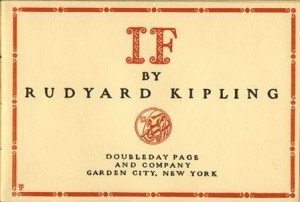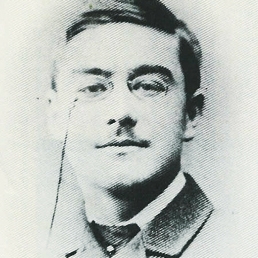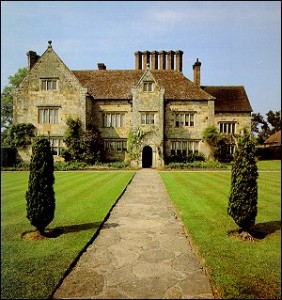Poetry in Translation (CXCV): Rudyard KIPLING (1865 – 1935), ENGLAND “If”, “Dacă, doar…”, “Si”
If
Rudyard KIPLING
(1865 – 1935)
If you can keep your head when all about you
Are losing theirs and blaming it on you;
If you can trust yourself when all men doubt you,
But make allowance for their doubting too:
If you can wait and not be tired by waiting,
Or, being lied about, don’t deal in lies,
Or being hated don’t give way to hating,
And yet don’t look too good, nor talk too wise;
If you can dream, and not make dreams your master;
If you can think, and not make thoughts your aim,
If you can meet with Triumph and Disaster
And treat those two impostors just the same:.
If you can bear to hear the truth you’ve spoken
Twisted by knaves to make a trap for fools,
Or watch the things you gave your life to, broken,
And stoop and build’em up with worn-out tools;
If you can make one heap of all your winnings
And risk it on one turn of pitch-and-toss,
And lose, and start again at your beginnings,
And never breathe a word about your loss:
If you can force your heart and nerve and sinew
To serve your turn long after they are gone,
And so hold on when there is nothing in you
Except the Will which says to them: “Hold on!”
If you can talk with crowds and keep your virtue,
Or walk with Kings—nor lose the common touch,
If neither foes nor loving friends can hurt you,
If all men count with you, but none too much:
If you can fill the unforgiving minute
With sixty seconds’ worth of distance run,
Yours is the Earth and everything that’s in it,
And, which is more, you’ll be a Man, my son!
* * * * * * * * * * * *
Dacă, doar…
Rudyard Kipling
(1865, Bombay – 1935, Londra)
Dacă doar capul ţi-ai păstra, când toţi din jurul tău
L-ar pierde, dar vina lor în cârcă ţi-ar urca;
Dacă nădejdea ţi-ai păstra, când toţi s-ar îndoi,
Scuzându-se la nesfârşit, în îndoiala lor:
De-ai aştepta fără să fii trudit,
Mereu minţit, fără să poţi minţi,
Atunci când lumea te-ar urî, fără să poţi urî,
Si fără să te-mpăunezi, sau să te dai viteaz;
Dac-ai visa fără, să crezi în visuri;
Dac-ai gândi, fără s-o faci anume,
De-ai înfrunta victorii şi dezastre,
Cu-acelaşi calm şi cumpăt, fără nume:
Dac-ai putea s-asculţi cuvântu-ţi sacru,
Netrebnic măsluit pentru nebuni,
Sau să priveşti cum lucrurile sfinte
Se pierd, iar tu le ‘nalţi din nou, cu braţe frânte;
De-ai pune la mezat toată averea
S-o rişti pe-un joc de cărţi,
S-o pierzi, doar ca s-o-ncepi din nou,
Să nu crâcneşti, deloc, de soarta vieţii:
Dar să-ti învingi şi inima şi gândul,
Cand n-or mai fi, doar cumpătul să-l ţii,
Ca să înfrunţi în viaţă nenorocul
Şi să îndemni, viteaz: “la lupte noi!”
Dacă la iarmaroc îţi ţii virtutea,
Sau printre regi păstra-vei bunul simţ,
Când nici duşmani, nici fraţi nu te-ar atinge,
In tine s-ar încrede, mai puţin:
De-ai împlini momentul care fuge,
Cu o solie demnă de Olimp,
Al tău sa fie Cerul şi Pământul!
Dar mai presus, virtutea de-a fi OM!
(Rendered in Romanian by Constantin ROMAN, London,
© 2013 Copyright Constantin ROMAN)
* * * * * * * * * * * *
“Si
Si puedes estar firme cuando en tu derredor
todo el mundo se ofusca y tacha tu entereza;
si cuando dudan todos, fías en tu valor
y al mismo tiempo sabes excusar su flaqueza;
si puedes esperar y a tu afán poner brida,
o blanco de mentiras esgrimir la verdad,
o siendo odiado al odio no dejarle cabida
y ni ensalzas tu juicio ni ostentas tu bondad;
Si sueñas pero el sueño no se vuelve tu rey:
si piensas y el pensar no mengua tus ardores;
si el triunfo o el desastre no te imponen su ley
y los tratas lo mismo, como a dos impostores:
si puedes soportar que tu frase sincera
sea trampa de necios en boca de malvados,
o mirar hecha trizas tu adorada quimera
y tornar a forjarla con útiles mellados…
…si puedes mantener en la ruda pelea
alerta el pensamiento y el músculo tirante
para emplearlos cuando en ti todo flaquea
menos la voluntad que te dice: “Adelante”;
Si entre la turba das a la virtud abrigo;
si, marchando con reyes del orgullo has triunfado;
si no pueden herirte ni amigo ni enemigo;
si eres bueno con todos, pero no demasiado,
si puedes llenar los preciosos minutos
con sesenta segundos de combate bravío,
tuya es la Tierra y todos sus codiciados frutos,
y lo que más importa: ¡serás hombre, hijo mío!”
© Dra. Gloria M. Sánchez Zeledón de Norris Yoyita.
NOTA DE PIE:
El editor está muy agradecido a El Señor Don Ray Escámez Rivero amablemente para proporcionar esta hermosa versión española, publicada anteriormente.
* * * * * * * * * * * *
Tu seras un Homme, mon fils
Si tu peux voir détruit l’ouvrage de ta vie
Et sans dire un seul mot te mettre à rebâtir,
Ou perdre en un seul coup le gain de cent parties
Sans un geste et sans un soupir ;
Si tu peux être amant sans être fou d’amour,
Si tu peux être fort sans cesser d’être tendre,
Et, te sentant haï, sans haïr à ton tour,
Pourtant lutter et te défendre ;
Si tu peux supporter d’entendre tes paroles
Travesties par des gueux pour exciter des sots,
Et d’entendre mentir sur toi leurs bouches folles
Sans mentir toi-même d’un mot ;
Si tu peux rester digne en étant populaire,
Si tu peux rester peuple en conseillant les rois,
Et si tu peux aimer tous tes amis en frère,
Sans qu’aucun d’eux soit tout pour toi ;
Si tu sais méditer, observer et connaître,
Sans jamais devenir sceptique ou destructeur,
Rêver, mais sans laisser ton rêve être ton maître,
Penser sans n’être qu’un penseur ;
Si tu peux être dur sans jamais être en rage,
Si tu peux être brave et jamais imprudent,
Si tu sais être bon, si tu sais être sage,
Sans être moral ni pédant ;
Si tu peux rencontrer Triomphe après Défaite
Et recevoir ces deux menteurs d’un même front,
Si tu peux conserver ton courage et ta tête
Quand tous les autres les perdront,
Alors les Rois, les Dieux, la Chance et la Victoire
Seront à tous jamais tes esclaves soumis,
Et, ce qui vaut mieux que les Rois et la Gloire
Tu seras un homme, mon fils.
(traduit de l’anglais par André Maurois, 1918)
SHORT BIO:
RUDYARD KIPLING was born in Bombay on December 30th 1865, son of John Lockwood Kipling, an artist and teacher of architectural sculpture, and his wife Alice. His mother was one of the talented and beautiful Macdonald sisters, four of whom married remarkable men, Sir Edward Burne-Jones, Sir Edward Poynter, Alfred Baldwin, and John Lockwood Kipling himself. Young Rudyard’s earliest years in Bombay were blissfully happy, in an India full of exotic sights and sounds. But at the tender age of five he was sent back to England to stay with a foster family in Southsea, where he was desperately unhappy. The experience would colour some of his later writing. When he was twelve he went to the United Services College at Westward Ho! near Bideford, where the Headmaster, Cormell Price, a friend of his father and uncles, fostered his literary ability.
Kipling’s “Stalky & Co.”, based on those schooldays, has been much relished by generations of schoolboys. Despite poor eyesight which handicapped him on the games field, he began to blossom. In 1882, aged sixteen, he returned to Lahore, where his parents now lived, to work on the Civil and Military Gazette , and later on its sister paper the Pioneer in Allahabad.
In his limited spare time he wrote many remarkable poems and stories which were published alongside his reporting. When these were collected and published as books, they formed the basis of his early fame.
In 1902 he sought the seclusion of a lovely seventeenth century house called Bateman’s near Burwash, nearby in Sussex, where he spent his remaining years. Puck of Pook’s Hill and Rewards and Fairies , which included the poem “If-“, and other well-known volumes of stories, were written there, and express Kipling’s deep sense of the ancient continuity of place and people in the English countryside.
King George V became a personal friend. The Kiplings travelled a great deal, and at the outset of one of their visits, in January 1936, Rudyard died, just three days before his King. He had declined most of the many honours which had been offered him, including a knighthood, the Poet Laureateship, and the Order of Merit, but in 1907 he had accepted the Nobel Prize for Literature.
Rudyard Kipling’s reputation grew from phenomenal early critical success to international celebrity, then faded for a time as his conservative views were held by some to be old-fashioned. The balance is now being restored.
More and more people are coming to appreciate his mastery of poetry and prose, and the sheer range of his work. His autobiography Something of Myself was written in 1935, the last year of his life and was published posthumously.
Extract from: http://www.kipling.org.uk/kip_fra.htm







No Comments so far ↓
There are no comments yet...Kick things off by filling out the form below.